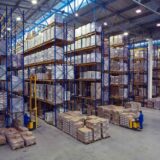Why Sustainability Matters in Freight Transport
July 6, 2024 0Sustainability & Green Logistics
In today’s rapidly evolving global economy, sustainability is no longer just a buzzword—it’s a necessity. As industries grow and consumer demand for goods rises, the environmental impact of freight transport is coming under increasing scrutiny. Freight transport, whether by road, rail, air, or sea, is one of the largest contributors to carbon emissions worldwide, and businesses are under pressure to adopt greener, more sustainable practices.
At Logix Across, we understand the importance of sustainability in logistics. Here’s why sustainability in freight transport matters and how Logix Across is committed to driving change in this critical sector.
The Environmental Impact of Freight Transport
The global logistics sector is responsible for a significant portion of the world’s greenhouse gas (GHG) emissions. According to the International Transport Forum (ITF), the freight transport industry contributes around 7-8% of global carbon emissions, with road transport being the largest emitter. The environmental footprint of freight transport includes:
- Fuel Consumption: Traditional freight methods often rely on fossil fuels like diesel and petrol, which contribute to air pollution and climate change.
- CO2 Emissions: Shipping, trucking, and aviation contribute to carbon dioxide (CO2) emissions, which are a leading cause of global warming.
- Air and Noise Pollution: Freight vehicles, especially trucks, are major contributors to air and noise pollution, which affect both local and global ecosystems.
- Waste Generation: Packaging waste from freight, including plastic and non-recyclable materials, poses environmental challenges at both the source and disposal stages.
As pressure increases to tackle climate change, the logistics industry must adopt practices that minimize its impact on the environment.
Why Sustainability Matters in Freight Transport
- Reducing Carbon Footprint
The primary reason sustainability matters in freight transport is its potential to reduce the industry’s carbon footprint. Shifting toward cleaner, more efficient transport modes can significantly lower greenhouse gas emissions. For example, switching to electric or hydrogen-powered trucks and using alternative fuels like biofuels can drastically reduce CO2 emissions. - Improving Air Quality
Sustainable freight solutions help reduce air pollution caused by emissions from traditional vehicles. By adopting cleaner energy sources and optimizing transportation routes, businesses can contribute to improved air quality, especially in urban areas where freight traffic is most concentrated. - Supporting Regulatory Compliance
Governments worldwide are introducing stricter environmental regulations to curb pollution and emissions. For example, the European Union has set ambitious climate targets that affect the freight and transport sectors. By prioritizing sustainability, companies can ensure compliance with current and future regulations, avoiding fines and maintaining their reputations. - Cost Efficiency in the Long Term
Sustainable freight solutions often lead to long-term cost savings. For example, investing in energy-efficient vehicles, optimizing supply chain routes, and reducing fuel consumption can lower operational costs. Furthermore, sustainable practices such as reducing packaging waste and enhancing warehouse energy efficiency can contribute to overall cost reductions. - Enhancing Brand Reputation
Consumers today are increasingly concerned about the environmental impact of the companies they buy from. By adopting green logistics and sustainable freight practices, businesses can improve their brand reputation and attract environmentally conscious customers. Consumers are more likely to support companies that prioritize sustainability in their supply chains. - Driving Innovation and Technology
The push for sustainability is driving innovation in the freight transport sector. New technologies, such as electric and autonomous vehicles, energy-efficient vessels, and carbon-neutral shipping options, are transforming the way freight is moved around the world. By adopting these innovations, companies can stay ahead of the curve and future-proof their operations.
Sustainable Freight Transport Practices
At Logix Across, we believe that sustainability is a key component of the future of logistics. Here’s how we’re helping drive positive change in the freight transport sector:
1. Optimizing Routes for Fuel Efficiency
One of the simplest and most effective ways to reduce emissions is by optimizing transportation routes. By utilizing advanced route planning software, we ensure that goods are delivered using the shortest and most efficient routes, reducing fuel consumption and cutting down on emissions.
2. Investing in Eco-Friendly Vehicles
We’re continuously exploring sustainable transport options, including electric trucks, hydrogen-powered vehicles, and fuel-efficient vessels. These technologies help reduce reliance on fossil fuels and lower carbon emissions.
3. Promoting Intermodal Transport
By combining different modes of transportation (e.g., rail, road, sea), Logix Across helps reduce the environmental impact of freight transport. Rail and sea freight, for instance, are generally more fuel-efficient than road transport and are ideal for longer-distance shipping.
4. Sustainable Packaging Solutions
Packaging waste is a significant concern in the logistics industry. At Logix Across, we work with our clients to develop sustainable packaging solutions that minimize waste and utilize recyclable materials, helping to reduce the environmental footprint of each shipment.
5. Green Warehousing and Energy-Efficient Practices
Sustainability in freight doesn’t stop at transportation. We’re committed to implementing energy-efficient practices in our warehouses, such as using renewable energy sources, optimizing lighting systems, and improving overall energy consumption.
6. Collaboration with Green Partners
We partner with eco-conscious carriers, suppliers, and stakeholders to ensure that sustainability is prioritized across the entire supply chain. Together, we work toward reducing emissions, minimizing waste, and creating a more sustainable logistics ecosystem.
The Future of Sustainable Freight Transport
The future of freight transport is undeniably green. As sustainability becomes increasingly critical, the logistics industry must continue innovating and adopting cleaner technologies. With the rise of electric vehicles, renewable energy sources, and smart logistics solutions, freight transport is evolving toward a more sustainable future.
At Logix Across, we are committed to being part of that future. Our sustainable logistics solutions not only benefit the environment but also provide our clients with cost-effective, efficient, and reliable services.
Logix Across: Your Partner in Sustainable Freight
Logix Across is dedicated to providing logistics solutions that prioritize sustainability while ensuring efficiency and cost-effectiveness. From optimizing routes to reducing packaging waste and investing in eco-friendly vehicles, we’re leading the way in green logistics.
Contact us today to learn more about how we can help you reduce the environmental impact of your supply chain while improving efficiency and performance. Let’s work together to create a greener future for freight transport.











